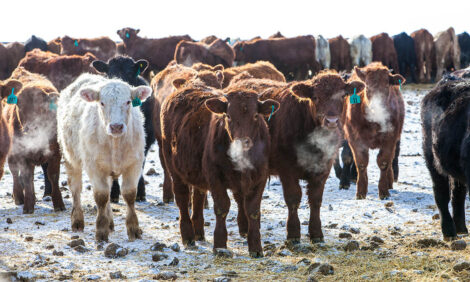



Need for early fly control strategy as warm, wet weather increases cattle risk
A leading livestock vet is warning of the increased risk from flies this springA leading livestock vet is warning of the increased risk from flies this spring and urging early action to prevent costly losses following one of the warmest and wettest springs on record.
According to the Met Office, UK winters are getting warmer and wetter, with the number of ground frosts declining1.
Vet Patricia van Veen from Zoetis said warm and wet weather provides optimum conditions for the overwintering of flies and the acceleration of maggot development. She suggests the best way to manage flies within a herd is to put controls in place before large fly numbers become visible.
"Implementing measures early in the season before flies are readily visible will make their control easier and more effective. Once you start seeing flies, the population has already exploded, making it harder to manage them.
"Fly traps are a good way to monitor levels on the farm. When you start seeing flies appearing in the traps, that is when appropriate action must be taken to protect stock," she said.
The main flies affecting cattle include stable, horn, house, face, and head flies. They can spread diseases such as summer mastitis and New Forest Eye and cause significant production losses due to constant irritation.
Studies in cattle have shown that fly worry can cause growth rate losses of up to 0.3kg a day and 0.5l a day milk loss2, mainly due to the 'hassle factor' leading to reduced feed intake.
"Not only do flies cause a significant financial loss, they are also a welfare concern," she explained.
Ms van Veen suggests the most effective control method is a two-step approach, using spot-on products or long-acting fly control ear tags, alongside environmental management to control fly breeding sites.
"When it comes to managing flies, farmers will have more success by combining chemical control alongside the management of fly breeding sites. Spot-on products like Fly & Lice Spot On® and DYSECT® and long acting fly control ear tags such as the Flectron® tag will help safeguard stock. The ear tags are particularly useful when cattle are grazed away from the farm, as they offer up to five months of protection against nuisance and biting flies,.
"However, ideally, their use should not be considered in isolation. Many fly species travel considerable distances to feed and survive over winter by their larvae burrowing into the ground. So, keeping stock away from fly breeding sites like wet and muddy areas can help reduce the risk," she said.
Fly numbers can also be managed by:
- Improving ventilation in sheds to create unfavourable conditions
- Providing good drainage
- Using fly sheeting in high-risk areas
- Keeping manure dry and compacted and turning it every 2-4 weeks
- Covering manure heaps and not overfilling slurry lagoons
Ms van Veen added: "A good fly control strategy is an important part of preventative healthcare for all livestock. Not only does it have the potential for improving productivity in your herd, but it also prevents costly diseases, which can have devastating consequences."
Product information: FLY & LICE SPOT ON contains deltamethrin. POM‑VPS. DYSECT CATTLE POUR-ON SOLUTION 15 MG/LITRE contains alphacypermethrin. FLECTRON FLY EAR TAGS FOR CATTLE 935 MG contains cypermethrin. For further information please see the product’s SPC or contact your medicine supplier or Zoetis UK First floor, Birchwood Building, Springfield Drive, Leatherhead KT22 7LP www.zoetis.co.uk. Customer Support: 0345 300 8034. Date of Preparation March 2024. MM-32913
| References | ||||
|---|---|---|---|---|
| 1. https://www.metoffice.gov.uk/about-us/press-office/news/weather-and-climate/2024/february-2024-warm-and-wet-for-the-uk | ||||
| 2. Jonsson et al (1999). Med. Vet. Entomology 13, p372-376 | ||||



